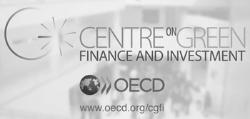Financial markets
Find
In focus
-
OECD Global Forum on Public Debt Management
This year’s forum will take place on 22-23 May 2023 at the OECD headquarters in Paris. It will focus on challenges and opportunities for public debt managers in the current context of geopolitical tensions, monetary policy normalisation and high borrowing needs.
Read more -
OECD Green Investment and Finance Forum
This annual event brings together leading actors from the green finance and investment community to promote effective engagement, collaboration and action on green finance and investment.
Read more -
Central Bank Digital Currencies (CBDCs) and democratic values
5/07/2023 - Discussions around Central Bank Digital Currencies (CBDCs) and related Central Banks initiatives are intensifying. This paper explores how CBDC design and implementation choices can guard economies against threats to individual liberties and human rights as well as promote equitable treatment of citizens, protection of privacy and ensure citizens’ trust in central banks.
Read more
OECD work on financial markets promotes efficient, open, stable and sound market-oriented financial systems, based on high levels of transparency, confidence, and integrity
The OECD Infrastructure PlatformInfrastructure is complex, long-term by nature, and involves numerous risks and stakeholders. The OECD Infrastructure Platform provides access to guidance, good practices, data and analysis to support policy makers in the pursuit of sustainable and quality infrastructure. |
The OECD Debt Transparency InitiativeLaunched following the outbreak of COVID-19, this Initiative collects, analyses and reports on private sector lending to vulnerable low-income countries, thereby allowing interested stakeholders to benefit from a better understanding of the public sector debt levels and conditions of vulnerable countries. |
 |
||
|
|
||||
|
|
|